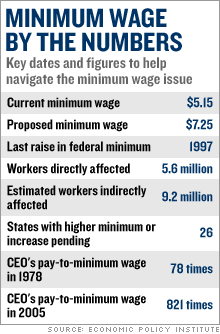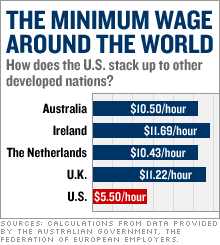In Senate, minimum wage, execs' pay in playSenate Democrats, seeking to pay for small-business tax breaks, eye increased taxes for offshoring, expatriates.NEW YORK (CNNMoney.com) -- The Senate Finance Committee approved a bill Wednesday that would give tax breaks to small businesses but would also close tax loopholes for CEO pay and large corporations. Finance Committee Chairman Max Baucus (D-Mo.), who proposed the bill, hopes to attach it to the Senate's minimum-wage bill when it comes to a floor vote in the coming weeks under Majority Leader Harry Reid (D-Nev.).   "Congress needs to raise the minimum wage now, and this package of tax incentives will help a minimum wage increase pass the Senate and be signed into law," said Baucus. A bill that would increase the minimum wage for the first time in 10 years was approved by a wide margin in the House last week. Many Republicans, including President Bush, believe a minimum-wage increase should be coupled with tax breaks for small businesses, which will face higher labor costs. The Senate Finance Committee bill, crafted using the Democrat's newly revived pay-as-you-go standard, would offset small-business breaks with revenue-generating adjustments that target large companies. One significant provision affecting CEOs: the committee gave the nod on legislation that would limit to $1 million dollars the amount top executives of a company could shift into tax-deferred compensation plans, which are common among executives at Fortune 500 companies. "The vast majority of Americans are limited in the amount of compensation they can defer from taxes, and this deferred compensation cap for executives is an appropriate step," said Baucus. For small businesses, the Senate bill includes a number of provisions that simplify tax rules, extend tax credits and increase expensing limits. The benefits, estimated to cost $8.3 billion, are being offset by the revenue from closing corporate tax loopholes and raising limits on fines affecting large companies. The Democrat-controlled House of Representative passed a "clean" bill last week to increase the minimum wage from $5.15 to $7.25 with no concessions for small business. The Senate minimum-wage bill vote is not expected for another week or two, after ethics and Iraq legislation is voted on. Several of the Senate finance bill's seven provisions are aimed at how small businesses account for investments, increasing deductibility and write-offs. The Work Opportunity Tax Credit would expand tax credits extended to small businesses for hiring disadvantaged workers, including veterans disabled in Afghanistan and Iraq. The two major offsets to pay for those tax breaks involve the taxing of companies' leasing arrangements with foreign entities and the taxing of revenue of companies that have relocated offshore. Tax accountant David Sands of Buchbinder Tunick & Cos. says pieces of the bill reflect a significant benefit for small businesses. "I'd certainly like to see this passed with or without the minimum wage," said Sands. Not everyone is happy about the prospect of the changes added to the minimum-wage bill. "We believe the [tax] legislation is totally unnecessary and uncalled for," said Bill Samuel of the AFL-CIO, which actively supports a minimum-wage increase. Samuel says the provisions "concede the false argument that a modest rise in minimum wage hurts small business." Ultimately, it may be difficult for Republicans to make too many demands. "Most people in the Senate think a [minimum wage bill] is what you have to do," said Emily Pierce of Roll Call, a newspaper that tracks politics. "Republicans know the minimum wage was a big issue in 2006 election for swing voters," Pierce said. "A lot of moderates got hurt." Six states passed ballot measures to raise the minimum wage in the 2006 midterm elections. Nationally, 28 states already have a higher minimum wage or have passed legislation that will raise it. A number of those states have automatic increases for inflation. Still, it's uncertain what to expect a final federal minimum-wage bill to look like. Democrats in the Senate have a slimmer majority and are mindful that they don't have to votes to override Republican opposition. Senate Democrats have the 51 votes needed to pass a minimum-wage bill but not the 60 votes needed to close debate, without which the final passage of the bill would be threatened. Democrats won majorities in Congress in 2006, for the first time since 1994. The cost of minimum wage will affect large retailers like Wal-Mart (Charts), Target (Charts) and Lowe's (Charts) directly or indirectly by creating more competitive rates at the lower end of the wage scale. --------------------------------------------------------------- |
Sponsors
|
